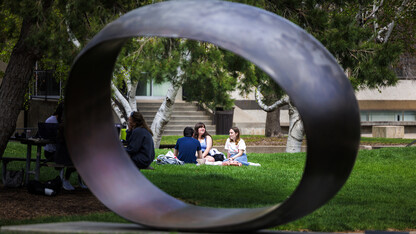· 8 min read
Nebraska in the national news: February 2021

A faculty member’s guest column offering historical perspective on the racial disparities of the COVID-19 pandemic was among the 30-plus national news stories featuring Husker faculty, staff, students, centers and programs in February.
Deirdre Cooper Owens, Wilson Professor of History and director of the Humanities in Medicine program at the University of Nebraska–Lincoln, wrote a Feb. 12 guest column for The Washington Post on the United States’ long history of medical racism. She noted the similarities between the 1793 yellow fever epidemic — where many Black Philadelphians served as front-line workers and died in disproportionate numbers — and the current pandemic.
Owens pointed out that a prominent publisher, Mathew Carey, wrote a pamphlet condemning Black workers in the 1793 epidemic, accusing them of looting the homes of their charges, robbing the dead of their valuables and essentially profiteering from the disease. Two Black ministers, Richard Allen and Absalom Jones, wrote an important political tract to refute the mistaken belief about Black people’s immunity to yellow fever and defend the Black community against charges of immorality and criminality.
“They did so with hard facts and quantitative data, providing statistical evidence of Black people’s deaths,” she wrote.
Owens touched on other instances of medical racism throughout U.S. history, including the Tuskegee syphilis study, the case of Henrietta Lacks, and Black women and girls in the South in the 1950s and 1960s receiving forced hysterectomies without their knowledge or consent.
She wrote that, thankfully, a number of major organizations — including the American Medical Association, the American College of Obstetricians and Gynecologists and the March of Dimes — have stepped up to declare medical racism a public health crisis.
“Medical racism has no place in a country where Black Americans, like those who worked and suffered during the 1793 yellow fever epidemic, have contributed so much to our society,” she wrote. “It is an outdated racial science that not only has made the United States the most dangerous developed nation for Black pregnant people to give birth, but also has made a respiratory disease into a racialized disease.”
More coverage:
Todd Thornock, accountancy, co-authored a recent study examining the impact of managers using emotional language in written and electronic performance feedback. Strategic Finance published a Feb. 1 article on the research.
Chigozie Obioma, English, an internationally recognized author, discussed his college experiences in Cyprus and the United States; his second novel, “An Orchestra of Minorities”; and how racism in America compares to that in other places, for a Feb. 2 Inland360.com article. On Feb. 10, he read from his work and answered audience questions as part of Washington State University’s Visiting Writers Series.
Obioma was also the featured guest on the Feb. 8 episode of Literary Hub’s History of Literature podcast. He discussed his childhood in Nigeria, his novels “The Fishermen” and “An Orchestra of Minorities,” what he’s discovered about how fiction works, his love for Kazuo Ishiguro’s “The Remains of the Day” and his recent work with the Alexander platform.
Yujia Wang, landscape architecture, was recently named to Forbes China’s 30 Under 30 list for fashion, lifestyle and food.
Bill Stephan, executive director of the Lied Center for Performing Arts, was interviewed for a Feb. 3 Newsy story on the post-pandemic future of cinema and live theater. He said donations have allowed the Lied Center to have a balanced budget for the current fiscal year. He pointed out that the venue was the first in the nation to host a Broadway or off-Broadway show during the pandemic.
The Lied Center was also highlighted in a Feb. 24 New York Times article on venues offering virtual productions. The Lied Center bought a five-camera system to broadcast work from its theater and has been using it since September. The venue’s spring season features Broadway Star Kelli O’Hara, mandolin virtuouso Chris Thile and the Silkroad Ensemble, with in-person and virtual attendance options.
Ruiguo Yang, mechanical and materials engineering, and colleagues have for the first time measured the breaking point and resilience of an organic bridge that connects two mature cells. Phys.org and Technology.org ran articles on the research.
James F. Tierney, law, was interviewed for a Feb. 4 CNN.com article on Robinhood CEO Vlad Tenev not being licensed by the Financial Industry Regulatory Authority. Tierney said recent comments by Tenev suggest he has a significant managerial role with respect to the National Securities Clearing Corporation, a Robinhood subsidiary. He said this would be a “pretty solid basis for FINRA to try to go after him for failure to register … even if Robinhood is trying to keep the parent and subsidiary formally separate.”
Eric Berger, law, discussed the second impeachment of former President Donald Trump Feb. 4 on the Faithful Politics podcast.
Justin “Gus” Hurwitz, law, director of the Nebraska Governance and Technology Center, was a guest on the Feb. 8 episode of the Cyberlaw Podcast. He discussed Sen. Amy Klobuchar’s push for antitrust legislation and Section 230 reform targeting Big Tech.
Santosh Pitla, advanced machinery systems, discussed the future of robotics in agriculture during a Feb. 9 segment on RFD-TV. He said the university is developing robotic platforms to plant cover crops and target weeds.
Christopher Mann, economics, was quoted in a Feb. 10 USA Today fact check on how state unemployment rates have been impacted by the COVID-19 pandemic. He said states such as Nebraska rely less on tourism than some other states and have not been drastically impacted by reduced travel. The story was picked up by MSN.com and Yahoo! News.
Adam Thimmesch, law, was interviewed for a Feb. 10 Wisconsin Examiner article on a bill in the Wisconsin legislature that would grant tax breaks to businesses with expenses covered by the federal Paycheck Protection Program. Thimmesch recently analyzed the issue for a national tax newsletter. It’s “double dipping,” he said. “You don’t have to report the income — and you deduct the expenses.”
An investigation led by Judy Wu-Smart, entomology, recently resulted in the emergency shutdown of the AltEn Ethanol plant near Mead, Progressive Farmer and the Lincoln Journal Star reported. Every beehive maintained at the nearby Eastern Nebraska Research and Extension Center since 2017 has collapsed, coinciding in timing with AltEn’s use of neonic-treated seed.
Following last year’s destructive derecho in the Midwest, Christine Wittich, civil and environmental engineering, is working to improve infrastructure and make communities less susceptible to natural hazards. Farm Progress America and the York News-Times ran stories on the research.
Troy Smith, management, co-authored a recent study showing that after abusive behavior some managers fake nice rather than make nice with employees as a means of repairing their social image. KNEB and Harvard Business Review published articles on the research.
New research led by Ingrid Haas, political science, has shown the human brain is processing politically incongruent statements differently — attention is perking up — and that the candidate’s conviction toward the stated position is also playing a role. Stories on the research have appeared in the Sidney Sun-Telegraph, Medical Xpress, Neuroscience News, Science Codex, Scienmag and a few other media outlets.
Krystle Rhoades, coordinator for the Testing Ag Performance Solutions (TAPS) program, recently wrote an article on the 2021 season, which will feature sprinkler irrigated corn, subsurface drip irrigated corn and sorghum competitions. This year’s sorghum contest will include both irrigated and dryland components. Ag Update ran the article Feb. 22.
Jessica Fargen Walsh, journalism, was recently the featured guest on the Daugherty Water for Food Podcast. She discussed her 2019 project “Nitrates in Nebraska: A Multimedia Journalism Project on the Impact of Nitrate Contamination in the Groundwater.” AgWired ran the podcast on its website Feb. 22.
A 2010 study by Dawn O. Braithwaite, interpersonal and family communication, and colleagues was highlighted in a Feb. 23 Wall Street Journal article on people relying on their “chosen family,” or close friends, during the COVID-19 pandemic. The study found that more “voluntary families” were “supplemental,” meaning members still got along with their biological or legal families but sought alternative kinds of support. Braithwaite was also quoted in the article.
Matthew Gormley, educational psychology, has co-authored a new study examining the long-term academic outcomes of college students with ADHD. The study found these students receive lower grades and are at higher risk of dropping out. Stories on the research appeared in Medical Xpress, Scienmag and several other media outlets.
Richard Edwards, director emeritus of the Center for Great Plains Studies, discussed Black settlers of the Great Plains Feb. 23 on South Dakota Public Broadcasting’s “In the Moment” program.
The university is taking steps toward increasing its sustainability by ordering two more biodigesters for its dining halls. Stories on the new biodigesters appeared in Smart Energy Decisions and more than 50 other media outlets.
New research by Kate Lyons, biological sciences, and colleagues at the University of New Mexico suggests that the offspring of massive bipedal dinosaurs outcompeted medium-sized species for food, which would help explain the surprising lack of species diversity in an animal group that dominated the planet for roughly 140 million years. Stories on the research appeared in Gizmodo, Science and several other media outlets.
Andrea Basche, agronomy and horticulture, was interviewed for a Feb. 26 Successful Farming article on soil aggregates. Adding cover crops to a crop system helps repair problem soils quicker and boosts water infiltration — an important function of good aggregate stability, she said.
UNL Opera’s production of “The Cunning Little Vixen” was highlighted in an article on live performances during the pandemic in the winter issue of Opera America Magazine. The production took place on the courtyard outside Kimball Recital Hall, with the orchestra performing inside the lobby. The singers operated large puppets, which helped make the distancing requirements feel natural.
Autoweek published a Feb. 28 article on the SAFER (Steel and Foam Energy Reduction) barriers developed by the university’s Midwest Roadside Safety Facility.







